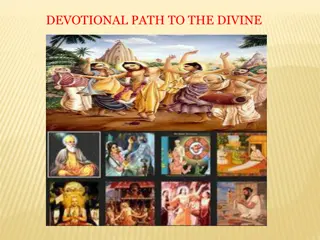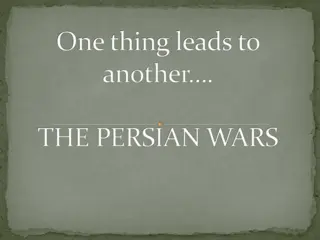Life and Legacy of Jalal ad-Din al-Rumi: A 13th-Century Persian Poet and Sufi Mystic
Rumi, born in 1207 in present-day Afghanistan, was a renowned Persian poet, scholar, and Sufi mystic. His works, primarily in Persian, have transcended borders and ethnic divisions, captivating audiences across centuries. Rumi's spiritual journey, from scholarly pursuits to mystical encounters with Shams-e Tabrizi, has left a profound impact on literature and Sufism worldwide.
Download Presentation

Please find below an Image/Link to download the presentation.
The content on the website is provided AS IS for your information and personal use only. It may not be sold, licensed, or shared on other websites without obtaining consent from the author.If you encounter any issues during the download, it is possible that the publisher has removed the file from their server.
You are allowed to download the files provided on this website for personal or commercial use, subject to the condition that they are used lawfully. All files are the property of their respective owners.
The content on the website is provided AS IS for your information and personal use only. It may not be sold, licensed, or shared on other websites without obtaining consent from the author.
E N D
Presentation Transcript
Rumi (30 September 1207 17 December 1273), was a 13th-century Persian poet, scholar, theologian, and Sufi mystic originally from Greater Khorasan. Rumi's national borders and ethnic divisions: Iranians, Tajiks, Turks, Greeks, Pashtuns, other Central Asian Muslims, and the Muslims of South appreciated his spiritual legacy for the past seven centuries. His poems have been widely translated into many of the world's languages and transposed into various formats. Rumi has been described as the "most popular poet" and the "best selling poet" in the United States. jurist, Islamic influence transcends Asia have greatly
Rumi's works are written mostly in Persian, but occasionally he also used Turkish, Arabic, and Greek, in his verse. His Masnavi (Mathnawi), composed in Konya, is considered one of the greatest poems of the Persian language. His works are widely read today in their original language across Greater Iran and the Persian-speaking world. Translations of his works are very popular, most notably in Turkey, Azerbaijan, the United States, and South influenced not only Persian Turkish, Ottoman Turkish, Azerbaijani, as well as the literature of some other Turkic, Iranian. Asia. literature, His poetry but has also
Rumi was born to native Persian-speaking parents, originally present-day Afghanistan. He was born either in Wakhsh, a village on the Vakhsh River in present-day Tajikistan, or in the city of Balkh, in present-day Afghanistan. Greater Balkh was at that time a major centre of Persian culture and Sufism had developed there for several centuries. from the Balkh, in
Rumi practised Sufism as a disciple of Burhan ud-Din until the latter died in 1240 or 1241. Rumi's public life then began: he became an Islamic Jurist, issuing fatwas and giving sermons in the mosques of Konya. He also served as a Molvi (Islamic teacher) and taught his adherents in the madrassa. During this period, Rumi also travelled to Damascus and is said to have spent four years there. It was his meeting with the dervish Shams-e Tabrizi on 15 November 1244 that completely changed his life. From an accomplished teacher and jurist, Rumi was transformed into an ascetic. Shams had travelled throughout the Middle East searching and praying for someone who could "endure my company". A voice said to him, "What will you give in return?" Shams replied, "My head!" The voice then said, "The one you seek is Jalal ud-Din of Konya." On the night of 5 December 1248, as Rumi and Shams were talking, Shams was called to the back door. He went out, never to be seen again. It is rumoured that Shams was murdered with the connivance of Rumi's son, 'Ala' ud-Din; if so, Shams indeed gave his head for the privilege of mystical friendship.
Rumi's love for, and his bereavement at the death of, Shams expression in an poems, Divan-e Shams-e Tabrizi. The general theme of Rumi's thought, like that of other mystic and Sufi poets of Persian literature, is that of tawhid union with the Beloved, from whom he sees himself as being cut off and aloof. found their lyric outpouring of
Rumi believed passionately in the use of music, poetry and dance as a path for reaching God. For Rumi, music helped devotees to focus their whole being on the divine and to do this so intensely that the soul was both destroyed and resurrected. It was from these ideas that the practice of whirling Dervishes developed into a ritual form. His teachings became the base for the order of the Mevlevi, which his son Sultan Walad organized. Rumi encouraged Sama, listening to music and turning or doing the sacred dance. In the Mevlevi tradition, sam represents a mystical journey of spiritual ascent through mind and love to the Perfect One. In this journey, the seeker symbolically turns towards the truth, grows through love, abandons the ego, finds the truth and arrives at the Perfect. The seeker then returns from this spiritual journey, with greater maturity, to love and to be of service to the whole of creation without discrimination with regard to beliefs, races, classes and nations. In other verses in the Masnavi, Rumi describes in detail the universal message of love: The lover s cause is separate Love is the astrolabe of God's mysteries. Shams arrived in Konya, preaching the possibility and necessity of direct communion with God. Rumi became a disciple and intimate friend to Shams; the two were rarely apart. It is said that Rumi s sons and followers were jealous of Shams and drove him from the city. from all other causes
Rumi's major work is the Manawye Ma'naw (Spiritual Couplets; ) , poem regarded by some Sufis as the Persian- language Qur'an. It is considered by many to be one of the greatest works of mystical poetry. Rumi's poetry forms classical Iranian and Afghan music. To many modern Westerners, his teachings are one of the best introductions to the philosophy and practice of Sufism. a six-volume the basis of much
Shahram Shiva asserts that "Rumi is able to verbalize the highly personal and often confusing world of personal growth and development in a very clear and direct fashion. He does not offend anyone, and he includes everyone.. Shahram Shiva is recording artist, and translator of the works of Rumi, a 13th-century philosopher. Shahram Shiva was born in Iran to a family of Jewish heritage and migrated to the US in his mid teens. He began translating Rumi's poetry in 1988 a performance poet, Persian poet and
His work has an all embracing universality. A call from an independent soul yearning for true freedom from dogma and hypocrisy. Rumi also writes about the abolishment of the established fear-based religious orders of the world. For Rumi fear-based religion is poison and his remedy doctrine--a life journey free of guilt, fear and shame. Rumi is an philosophical force. is love-based exciting literary and
Yunus em e]) (1238 1320) was a Turkish poet and Sufi mystic who greatly influenced Anatolian culture. Yunus Emre has exercised immense influence on Turkish literature. one of the first known poets to have composed works in the spoken Turkish of his own age and region rather than in Persian or Arabic. His diction remains very close to the popular speech of his contemporaries in Central and Western Anatolia. This is also the language of a number of anonymous folk-poets, folk-songs, fairy tales, riddles (tekerlemeler), and proverbs. Emre (Turkish pronunciation: [ju nus
the Turkish occasional use of tekerlemeler as a poetic device had been handed down orally to him and his contemporaries. This period of utmost unrest and turmoil shaped by all these difficulties which the people of Anatolia suffered, also shaped the remarkable character, the poetry and inner world of Yunus Emre. Through this terrible time, he spent his entire life trying to establish peace and unity in Anatolia, with both his ideas and his efforts. In pursuit of this, he traveled extensively among all the local rulers, explaining the significance of unity and peace to them: his great service was to give voice to and stimulate an awareness of these ideals in Anatolia. folklore that inspired Yunus Emre in his
In this way, Yunus Emre begun to pile up sorrow within himself for reasons which are unknown. The more his sorrow increased, the lonelier he became in a crowd. This loneliness, even among other people, was his sole friend; he was now the close friend of those who sorrow. In his village, if someone had sorrow and was in misery, Yunus would visit eagerly to share the sorrow, no matter who the person was. From that time on, everyone's sorrow, everyone's difficulty turned out to be Yunus Emre's own sorrow. He prayed to the Creator to help those who found this strange affliction in themselves: with his prayers to God Yunus sought a remedy for their sorrow.
Yunus Emre is considered by many to be one of the most important Turkish poets. Little can be said for certain of his life other than that he was a Sufi dervish of Anatolia. The love people have for his liberating poetry is reflected in the fact that many villages claim to be his birthplace, and many others claim to hold his tomb. He probably lived in the Karaman area. His poetry expresses a deep personal mysticism and humanism and love for God. He was a contemporary of Rumi, who settled in the same region after having moved from what is today Afghanistan. Rumi composed his collection of stories and songs for a well-educated urban circle of Sufis, writing primarily in the literary language of Persian. Yunus Emre, on the other hand, traveled and taught among the rural poor, singing his songs in the Turkish language of the common people. A story is told of a meeting between the two great souls: Rumi asked Yunus Emre what he thought of his great work the Mathnawi. Yunus Emre said, "Excellent, excellent! But I would have done it differently." Surprised, Rumi asked how. Yunus replied, "I would have written, 'I came from the eternal, clothed myself in flesh, and took the name Yunus.'" That story perfectly illustrates Yunus Emre's simple, direct approach that has made him so beloved.























